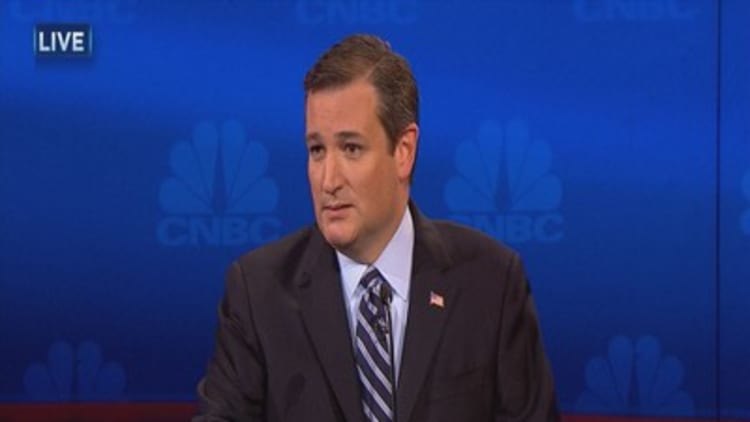
The classical "gold standard" was abandoned in the Great Depression of the 1930s, but Senator Ted Cruz resurfaced the idea of backing the U.S. dollar with gold during the Republican presidential debate on Wednesday evening.
His words ignited an extended conversation on social media site Twitter — but was this just political chit chat or could the U.S. really return to the gold standard?
"It's never going to happen..never on the terms that people are talking about anyway," Adrian Ash, the head of research at online bullion trader BullionVault, told CNBC via telephone.
Ash likened it to occasional suggestions from European politicians about repatriating their gold reserves from the U.S.
He called talk about the gold standard "populist" and a means to generate "political capital" and said that it formed part of a wider protest about the ultralow interest rates that have become the norm since the global financial crash of 2008.
"Gold standards need strongly positive real interest rates," he underlined, adding that central bankers were currently focusing on zero or even negative rates.
'Deep concerns'
Cruz said Wednesday that he had "deep concerns" about the Federal Reserve and said it should be focused on "sound money and monetary stability, ideally tied to gold."
He's not the first Republication would-be president to tout the idea in recent years — former U.S. Representative Ron Paul of Texas made it a focus in his 2012 presidential campaign.
And back in 1981, then-President Ronald Reagan created a "gold commission" to look at the idea, but ultimately decided not to go back to the gold standard.
It was the Richard Nixon administration that completely severed the link between gold and the dollar in the early 1970s – even after the gold standard was ditched in 1930s, foreign government were still allowed to exchange the greenback for bullion. Fixed amounts of gold were directly convertible to the U.S. dollar and vice versa. This meant the money supply was theoretically limited by the amount of gold backing it and exchange rates were based on the difference in price for an ounce of gold in different currencies.
'Comically bad idea'
While some economists argue that the era of the gold standard was marked by price stability, Nobel prize-winning economist Paul Krugman said that reinstating the system would be an "almost comically bad idea" in his New York Times column in 2012.
One deterrent would be the large U.S. deficit, which would make it hard to maintain the currency link to the supply of gold. U.S. federal debt is currently above $18 trillion, up from around $400 billion in 1971 when Nixon severed all links to gold.
Meanwhile, Ash said that any gold bugs hoping for a fillip in the price, if it ever came into being, would be sorely mistaken.
"The gold would be taken off the (gold bugs) at gunpoint," he said. "No government is ever going to make you rich because you bought gold."




